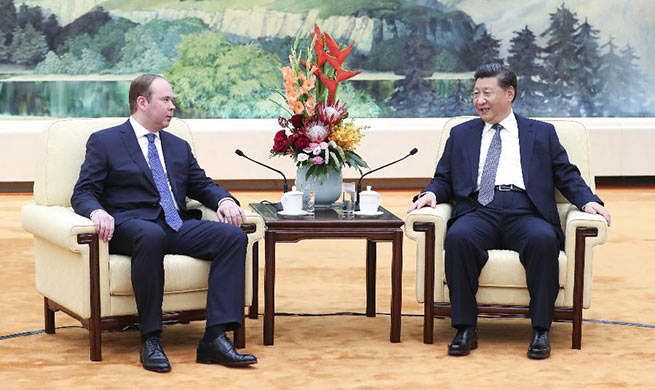by Eric J. Lyman
ROME, Oct. 17 (Xinhua) -- Italy moved closer to a major collision with the European Union (EU) with the formal submission of its draft for the country's 2019 budget, and analysts said political factors may make it less likely Italy will back down.
Earlier this month, Italy released a budget outline predicting a deficit the equivalent to 2.4 percent of gross domestic product (GDP), significantly higher than the 0.8 percent that the EU was expecting.
The formal draft budget released this week was in line with the earlier outline, but with more specifics.
Included in the budget, for example, is a plan to provide Italians with a minimum monthly income of 780 euros (900 U.S. dollars). It would also increase the minimum amount given to pensioners by the same amount, up from the current 500 euros per month.
The draft leaves many aspects unclear. It lacks specifics on whether or not all adult members of the same family will receive the benefit along with other rules on qualifying standards. Additionally, according to Alessandro Missale, a political economist with the State University of Milan, the budget also predicts Italy will receive 15 billion euros in new revenue, but it does not explain where half of that will come from.
"If anything, I think a budget deficit of 2.4 percent (of gross domestic product) may turn out to be an understatement," Missale told Xinhua.
The deficit plan is more or less in the range of those of recent years. In Italy's 2016-2018 budgets, the deficit was 2.6 percent of GDP, then 2.5 percent, and 2.3 percent, respectively. As recently as 2009, Italy's budget deficit was much higher: 5.2 percent of GDP.
Missale said the reason the planned 2019 deficit is a problem is because previous budgets were based on predictions for future years that would require the deficit to start shrinking by 2019.
The European Commission must now approve or reject the draft budget. If it is rejected, as expected, commissioners will have to decide how to try to force Italy to change its plans.
According to Giampaolo Arachi, a finance professor at the University of Salento, the difference between a budget deficit of 2.4 percent of GDP is not in itself problematic, in strict economic terms.
"The biggest problem with the 2019 budget is political," Arachi said in an interview. "A clash with the European Commission would cause some problems. But it might also force the government to stand by its plans no matter what."
The Italian government, headed by Prime Minister Giuseppe Conte, is backed by two political parties: the anti-establishment Five-Star Movement and the populist, euro-skeptic League.
The Five-Star Movement backed the plan for a minimum monthly income and higher pensions, while the League has repeatedly called on the EU to relax budget rules for Italy. The consensus among polls is that backers of both parties strongly approve of the Conte government standing up to European officials.
"A quarrel with the European Union is seen as strong by many backers," Arachi said. "In that context, the election for the European Parliament next year might actually incentivize the parties to have a high-profile disagreement with the European Union. That kind of disagreement could be a benefit for the parties."












